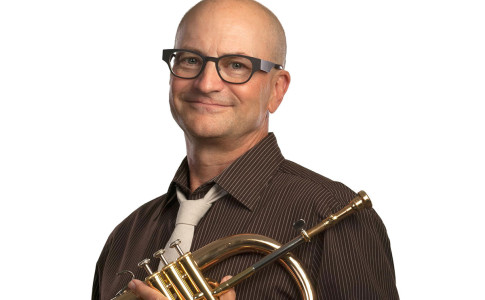Looking to the past, present and future, Dr. William F. McQueen III honors former director George Edwards while moving the band forward to several major performances including its fourth appearance in the Honda Battle of the Bands.
Photo by Lionel Harris. Courtesy of American Honda Motor Co.
The Prairie View A&M University Marching Storm suffered a great loss in May 2009 when director George “Prof” Edwards was in a fatal car crash. In his memory the band continued to excel— going all the way to the HBCU band flagship event, the Honda Battle of the Bands Invitational Showcase. Halftime Magazine caught up with now-director Dr. William F. McQueen III to find out how he transitioned with the band and succeeded under such difficult circumstances.
Halftime: What is your marching background?
McQueen: I started playing trumpet in 5th grade. I got a scholarship to Florida A&M and graduated, then got my Masters at Florida State. I went to Michigan State for my Ph.D. and finished the recital and thesis but not the coursework. I came to Prairie View from 1978 to 1984 as director, then I went to law school. Came back to the university [and taught in the College of Business and the Division of Social Work, Behavioral and Political Science] and returned to marching band in 1998. This 2009 year I became head marching band director. I’ve been a part of the marching band and music scene for a long time.
Halftime: How did you and the band deal with the tragic death of George Edwards?
McQueen: It was difficult. Mr. Edwards and I were in the band together at FAMU; he was a senior when I was a freshman. When I was at Michigan State, he was teaching in the public school system, so we saw each other there. I was band director from 1978 to 1984 [at Prairie View A&M], and then he became band director. I guess it could have been worse, but since I’ve been here working and recruiting the kids, it was better to have somebody like me in-house to take over rather than getting somebody else to come in and do things in a new way. It would have been difficult to have someone who didn’t know our traditions.
Halftime: What did you do to ease the transition for yourself and the students?
McQueen: The first three shows we did were dedicated to Mr. Edwards— Houston, Dallas and homecoming. At the homecoming show, we passed out 1,000 balloons to the audience. And in the middle of the show, we stopped and paid tribute to him, and everyone released the balloons. I had 35 white doves that did a spectacular show that had everyone in tears—it was very emotional and helped us to turn the corner and move on. There were a lot of alumni present and a lot of former band members that were there.
Halftime: And how was the Honda Battle of the Bands this year?
McQueen: Well this year was our fourth time participating. I’ve heard we had the best show there. Of course it’s not 1st place, 2nd place, 3rd place—it’s a showcase. To be invited is an honor, and that is the honor.
Halftime: What special performances has your band participated in?
McQueen: We played for the Houston Texans. We did the halftime show. We did a patriotic show and featured five piccolos playing “Stars and Stripes Forever” and did a majorette dance routine and band dance. We did the inauguration for President George W. Bush. Of course we’ve done the Rose Parade. We’ve done a halftime show with Destiny’s Child for the Dallas Cowboys.
Halftime: What do you want your students to learn from band?
McQueen: Well, leadership, discipline, hard work and more than anything, to learn that we are not here by accident— we have a purpose, and the university and the band should be better because you are a part of it. The band is better than it was when you got here; somebody’s life is enriched; someone was helped because you were there.


